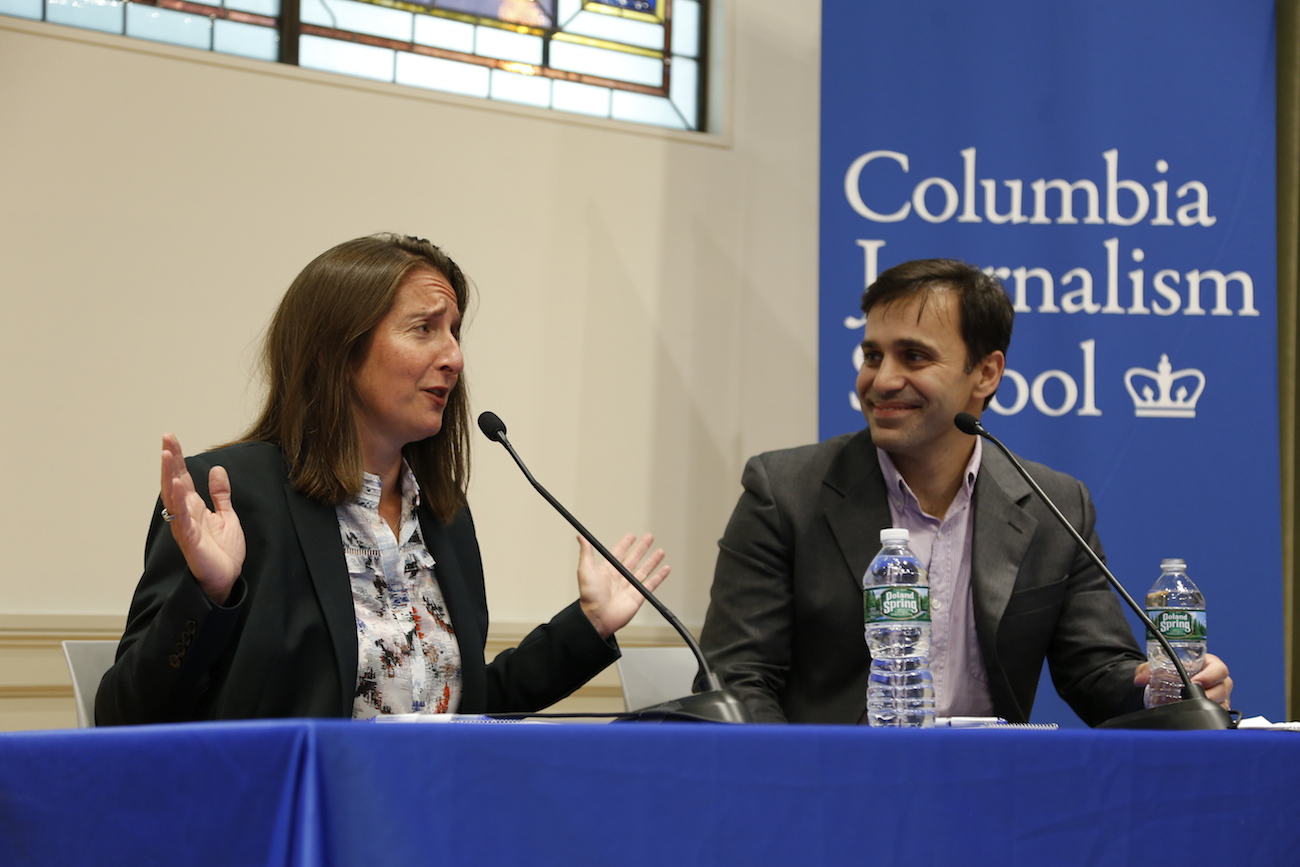Sign up for The Media Today, CJR’s daily newsletter.
Journalists at Gizmodo Media Group haven’t shied away from hard-hitting reporting since Hulk Hogan’s privacy lawsuit bankrupted its parent company, Gawker, last year. That’s according to Gizmodo general counsel Lynn Oberlander, who says “the reason they hired me is because I’m a journalist’s lawyer, and they want to be in a position to do aggressive journalism.”
Oberlander, who spoke to students at Columbia Journalism School this week, has been busy. Gizmodo publications have faced a number of libel suits since she was hired in February. Pro-Trump writer Cassandra Fairbanks is suing a Fusion reporter who tweeted that she made a white power hand gesture. And Hogan’s lawyer, Charles Harder, has brought fresh libel cases against old stories on a sports-betting operation and a life-coach’s “cult” which ran in Deadspin and Jezebel, respectively.
ICYMI: Toronto Star wine column leaves bad taste
The suits come amid a concerning surge in legal action against journalists in recent months, and high-profile public figures arguing it should be easier for them to sue news outlets. In addition to Hogan’s deadly privacy hit on Gawker, Donald Trump, during his presidential campaign, repeatedly threatened to loosen libel laws. (He has yet to deliver.)
“Our president has contributed to the atmosphere with which people think they can bring crazy claims against the media and maybe win,” Oberlander said.
Oberlander said libel, in particular, “is back.” Recent big-money settlements have had a chilling effect on sections of the press. In June, ABC News settled a defamation case over a report questioning the safety of so-called pink slime, a processed beef product — paying out $177 million themselves with unspecified additional costs covered by insurance.
“It is so expensive to defend these cases. It is just crazy expensive. And many organizations just don’t have those resources,” Oberlander said in an interview with CJR after her conversation with George Delacorte Professor Keith Gessen, a part of the Delacorte lecture series.
The $140 million payout mandated by a Florida court in Hogan’s privacy case against Gawker, which was bankrolled by Silicon Valley billionaire Peter Thiel, was a chilling development for media companies that are already battling to keep costs down.
Oberlander says the ramifications of the Hogan case are being felt across the media. While she doesn’t think it sets much of a legal precedent, “it is a precedent that juries can give away a lot of money and then can bankrupt a company, and it’s some level of a precedent that rich people can finance other people’s lawsuits and bankrupt media organizations.”
Oberlander declined to discuss the ongoing Jezebel suit, but pointed to a statement Gizmodo made after it was filed saying, “This case is nothing more than another obvious attempt by Charles Harder to intimidate journalists. The story in question was published on May 10, 2016 – months before our acquisition of certain Gawker Media assets, including Jezebel.”
The use of anti-journalist tactics—both inside and outside the courtroom—is nothing new. Oberlander reflected on a story she oversaw during her spell as general counsel at The New Yorker, in which writer Lawrence Wright took on the Church of Scientology: The scientologists didn’t sue, but did mock up a parody issue of The New Yorker, which they distributed outside its offices, bearing the headline, “The New Yorker: What a Load of Balderdash.”
Sometimes the consequences for journalists aren’t as humorous. Oberlander recalled a suit from her time at Forbes, which was accused of libel by the Russian oligarch Boris Berezovsky. Although Berezovsky sued under the more permissive libel laws of the UK, Oberlander and her team persuaded him to withdraw the case in exchange for a partial retraction in 2003. A year later, however, the American journalist who wrote the piece, Paul Klebnikov, was murdered in Moscow. Berezovsky, who himself died in suspicious circumstances in 2013, denied any involvement.
“We forget that journalists are killed for what they write and they’re silenced all the time,” Oberlander said. “It was an interesting litigation but it had a really dramatic and sad coda.”
Oberlander spoke of ways journalists might protect themselves against libel and other legal threats, including a fund administered by another of her former employers, First Look Media, publisher of The Intercept. The fund also gives money to journalists looking to bring suits against authorities who withhold public information or impinge on press freedom.
She advised the audience of student journalists to take extra care to protect themselves against libel suits, warning them not to make loose promises to sources about how their words would be used. “Journalists who are engaging people and trying to get them to participate in stories need to be really careful,” she said.
ICYMI: The New York Times tweet that angered some twitter users
Has America ever needed a media defender more than now? Help us by joining CJR today.



